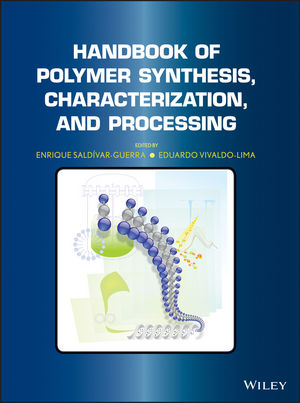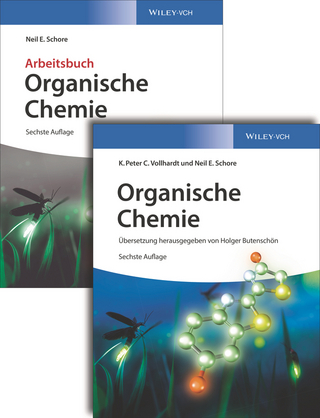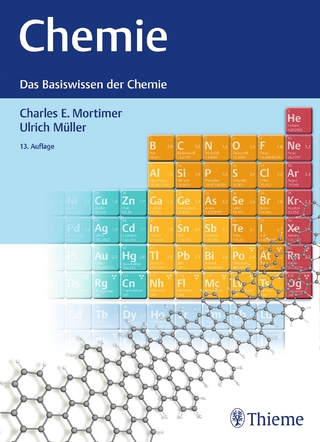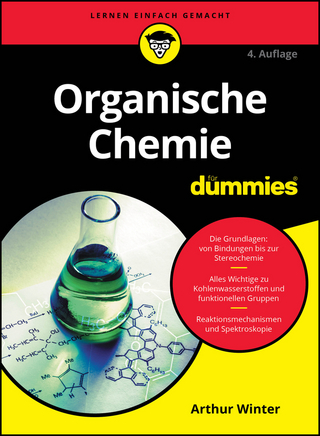
Handbook of Polymer Synthesis, Characterization, and Processing
John Wiley & Sons Inc (Verlag)
978-0-470-63032-7 (ISBN)
Covering a broad range of polymer science topics, Handbook of Polymer Synthesis, Characterization, and Processing provides polymer industry professionals and researchers in polymer science and technology with a single, comprehensive handbook summarizing all aspects involved in the polymer production chain. The handbook focuses on industrially important polymers, analytical techniques, and formulation methods, with chapters covering step-growth, radical, and co-polymerization, crosslinking and grafting, reaction engineering, advanced technology applications, including conjugated, dendritic, and nanomaterial polymers and emulsions, and characterization methods, including spectroscopy, light scattering, and microscopy.
ENRIQUE SALDÍVAR-GUERRA is Senior Scientist and Head of the Polymerization Processes Department at the Center for Research on Applied Chemistry in Mexico. Formerly the president of the Mexican Polymer Society, he holds five patents and serves as a reviewer for the Journal of Applied Polymer Science, Industrial & Engineering Chemistry Research, and Macromolecular Theory and Simulations, among others. EDUARDO VIVALDO-LIMA is Professor in the Department of Chemical Engineering of the Faculty of Chemistry at Universidad Nacional Autónoma de México, and External Academic Member of the Institute for Polymer Research of the University of Waterloo in Canada. A former president of the Mexican Polymer Society, Dr. Vivaldo-Lima is a reviewer for quite a number of journals, including Polymer Engineering & Science, Journal of Applied Polymer Science, Macromolecular Theory and Simulations, and Macromolecular Reaction Engineering.
Preface xv
Acknowledgments xvii
Contributors xix
Part I Basic Concepts 1
1 Introduction to Polymers and Polymer Types 3
Enrique Saldívar-Guerra and Eduardo Vivaldo-Lima
1.1 Introduction to Polymers 3
1.2 Classification of Polymers 8
1.3 Nomenclature 12
References 13
2 Polymer States and Properties 15
J. Betzabe González-Campos, Gabriel Luna-Bárcenas, Diana G. Zárate-Triviño, Arturo Mendoza-Galván, Evgen Prokhorov, Francisco Villaseñor-Ortega, and Isaac C. Sanchez
2.1 Introduction 15
2.2 Glass Transition Temperature (α-Relaxation) Controversy in Chitin, Chitosan, and PVA 16
2.3 Glass Transition Related to the α-Relaxation 16
2.4 Moisture Content Effects on Polymer’s Molecular Relaxations 17
2.5 Dielectric Fundamentals 18
2.6 Chitin, Chitosan, and PVA Films Preparation for Dielectric Measurements 21
2.7 Dielectric Relaxations in Chitin: Evidence for a Glass Transition 22
2.8 Dielectric Relaxations in Neutralized and Nonneutralized Chitosan: The Stronger Water Content Effect on the α-Relaxation and the Glass Transition Phenomenon 30
2.9 PVA Dielectric Relaxations 35
References 38
Part II Polymer Synthesis and Modification 41
3 Step-Growth Polymerization 43
Luis E. Elizalde, Gladys de los Santos-Villarreal, José L. Santiago-García, and Manuel Aguilar-Vega
3.1 Introduction 43
3.2 Polymerization Kinetics 46
3.3 Polyamides 48
3.4 Polyimides 50
3.5 Polyesters 50
3.6 Inorganic Condensation Polymers 53
3.7 Dendrimers 54
3.8 Thermoset Polycondensation Polymers 55
3.9 Controlled Molecular Weight Condensation Polymers 57
References 62
4 Free Radical Polymerization 65
Ramiro Guerrero-Santos, Enrique Saldívar-Guerra, and José Bonilla-Cruz
4.1 Introduction 65
4.2 Basic Mechanism 66
4.3 Other Free Radical Reactions 68
4.4 Kinetics and Polymerization Rate 71
4.5 Molecular Weight and Molecular Weight Distribution 74
4.6 Experimental Determination of Rate Constants 76
4.7 Thermodynamics of Polymerization 77
4.8 Controlled Radical Polymerization 78
References 81
5 Coordination Polymerization 85
João B. P. Soares and Odilia Pérez
5.1 Introduction 85
5.2 Polymer Types 87
5.3 Catalyst Types 87
5.4 Coordination Polymerization Mechanism 93
5.5 Polymerization Kinetics and Mathematical Modeling 93
References 101
6 Copolymerization 105
Marc A. Dubé, Enrique Saldívar-Guerra, and Iván Zapata-González
6.1 Introduction 105
6.2 Types of Copolymers 106
6.3 Copolymer Composition and Microstructure 107
6.4 Reaction Conditions: Considerations 118
References 121
7 Anionic Polymerization 127
Roderic Quirk
7.1 Introduction 127
7.2 Living Anionic Polymerization 127
7.3 General Considerations 129
7.4 Kinetics and Mechanism of Polymerization 134
7.5 Stereochemistry 144
7.6 Copolymerization of Styrenes and Dienes 148
7.7 Synthetic Applications of Living Anionic Polymerization 150
References 157
8 Cationic Polymerizations 163
Filip E. Du Prez, Eric J. Goethals, and Richard Hoogenboom
8.1 Introduction 163
8.2 Carbocationic Polymerization 163
8.3 Cationic Ring-Opening Polymerization 172
8.4 Summary and Prospects 181
Acknowledgment 181
References 181
9 Crosslinking 187
Julio César Hernández-Ortiz and Eduardo Vivaldo-Lima
9.1 Introduction 187
9.2 Background on Polymer Networks 187
9.3 Main Chemical Routes for Synthesis of Polymer Networks 191
9.4 Characterization of Polymer Networks and Gels 193
9.5 Theory and Mathematical Modeling of Crosslinking 195
Appendix A Calculation of Average Chain Length 200
Appendix B Calculation of Sol and Gel Fractions 201
Acknowledgments 202
References 202
10 Polymer Modification: Functionalization and Grafting 205
José Bonilla-Cruz, Mariamne Dehonor, Enrique Saldívar-Guerra, and Alfonso González-Montiel
10.1 General Concepts 205
10.2 Graft Copolymers 207
References 219
11 Polymer Additives 225
Rudolf Pfaendner
11.1 Introduction 225
11.2 Antioxidants 227
11.3 PVC Heat Stabilizers 231
11.4 Light Stabilizers 233
11.5 Flame Retardants 235
11.6 Plasticizers 238
11.7 Scavenging Agents 239
11.8 Additives to Enhance Processing 240
11.9 Additives to Modify Plastic Surface Properties 240
11.10 Additives to Modify Polymer Chain Structures 241
11.11 Additives to Influence Morphology and Crystallinity of Polymers 242
11.12 Antimicrobials 243
11.13 Additives to Enhance Thermal Conductivity 243
11.14 Active Protection Additives (Smart Additives) 243
11.15 Odor Masking 244
11.16 Animal Repellents 244
11.17 Markers 244
11.18 Blowing Agents 244
11.19 Summary and Trends in Polymer Additives 245
References 245
Further Reading 246
Part III Polymerization Processes and Engineering 249
12 Polymer Reaction Engineering 251
Alexander Penlidis, Eduardo Vivaldo-Lima, Julio César Hernández-Ortiz, and Enrique Saldívar-Guerra
12.1 Introduction 251
12.2 Mathematical Modeling of Polymerization Processes 252
12.3 Useful Tips on Polymer Reaction Engineering (PRE) and Modeling 257
12.4 Examples of Several Free Radical (Co)Polymerization Schemes and the Resulting Kinetic and Molecular Weight Development Equations 264
Acknowledgments 270
References 270
13 Bulk and Solution Processes 273
Marco A. Villalobos and Jon Debling
13.1 Definition 273
13.2 History 273
13.3 Processes for Bulk and Solution Polymerization 274
13.4 Energy Considerations 287
13.5 Mass Considerations 289
References 292
14 Dispersed-Phase Polymerization Processes 295
Jorge Herrera-Ordóñez, Enrique Saldívar-Guerra, and Eduardo Vivaldo-Lima
14.1 Introduction 295
14.2 Emulsion Polymerization 295
14.3 Microemulsion Polymerization 303
14.4 Miniemulsion Polymerization 304
14.5 Applications of Polymer Latexes 304
14.6 Dispersion and Precipitation Polymerizations 305
14.7 Suspension Polymerization 305
14.8 Controlled Radical Polymerization (CRP) in Aqueous Dispersions 308
References 310
15 New Polymerization Processes 317
Eduardo Vivaldo-Lima, Carlos Guerrero-Sánchez, Christian H. Hornung, Iraís A. Quintero-Ortega, and Gabriel Luna-Bárcenas
15.1 Introduction 317
15.2 Polymerizations in Benign or Green Solvents 317
15.3 Alternative Energy Sources for Polymerization Processes 327
15.4 Polymerization in Microreactors 329
Acknowledgments 331
References 331
Part IV Polymer Characterization 335
16 Polymer Spectroscopy and Compositional Analysis 337
Gladys de los Santos-Villarreal and Luis E. Elizalde
16.1 Introduction 337
16.2 Elemental Analysis 337
16.3 Infrared Spectroscopy 339
16.4 Nuclear Magnetic Resonance of Polymers in Solution 343
16.5 Mass Spectrometry 351
References 353
17 Polymer Molecular Weight Measurement 355
María Guadalupe Neira-Velázquez, María Teresa Rodríguez-Hernández, Ernesto Hernández-Hernández, and Antelmo R. Y. Ruiz-Martínez
17.1 Introduction 355
17.2 Historical Background 355
17.3 Principles of GPC 356
17.4 Measurement of Intrinsic Viscosity 362
References 365
18 Light Scattering and its Applications in Polymer Characterization 367
Roberto Alexander-Katz
18.1 Introduction 367
18.2 Principles of Static and Dynamic Light Scattering 367
18.3 Static Light Scattering by Dilute Polymer Solutions 370
18.4 Dynamic Light Scattering 377
References 387
19 Small-Angle X-Ray Scattering of Polymer Systems 391
Carlos A. Avila-Orta and Francisco J. Medellín-Rodríguez
19.1 Introduction 391
19.2 Polymer Morphology 391
19.3 Small-Angle X-Ray Scattering 393
19.4 Analysis in Reciprocal Space 395
19.5 Analysis in Real Space 399
Appendix A Procedure to Obtain Morphological Data from 1D SAXS Profiles 404
References 406
20 Microscopy 409
Mariamne Dehonor, Carlos López-Barrón, and Christopher W. Macosko
20.1 Introduction 409
20.2 Transmission Electron Microscopy 409
20.3 Three-Dimensional Microscopy 416
References 421
21 Structure and Mechanical Properties of Polymers 425
Manuel Aguilar-Vega
21.1 Structure of Polymer Chains 425
21.2 Mechanical Properties of Polymers 426
21.3 Mechanical Properties of Polymer Composites 431
References 434
Part V Polymer Processing 435
22 Polymer Rheology 437
Estanislao Ortíz-Rodríguez
22.1 Introduction to Polymer Rheology Fundamentals 437
22.2 Linear Viscoelasticity 440
22.3 Viscometric Techniques for Polymer Melts 441
22.4 Overview of Constitutive Equations 443
22.5 Brief Overview on Other Relevant Polymer Rheology Aspects 445
References 448
23 Principles of Polymer Processing 451
Luis F. Ramos-de Valle
23.1 General 451
23.2 Compounding 451
23.3 Extrusion 452
23.4 Bottle Blowing 455
23.5 Injection Molding 455
23.6 Thermoforming 460
References 461
Further Reading 461
24 Blown Films and Ribbons Extrusion 463
Jorge R. Robledo-Ortíz, Daniel E. Ramírez-Arreola, Denis Rodrigue, and Rubén González-Núñez
24.1 Introduction 463
24.2 Extrusion Processes for Blown Films and Ribbons 463
24.3 Equations 465
24.4 Ribbon and Film Dimensions 467
24.5 Cooling Process and Stretching Force 467
24.6 Morphology and Mechanical Properties 469
References 472
25 Polymer Solutions and Processing 473
Dámaso Navarro Rodríguez
25.1 Introduction 473
25.2 Polymer Solution Thermodynamics and Conformation of Polymer Chains: Basic Concepts 474
25.3 Semidilute Polymer Solutions 481
25.4 Processing of Polymer Solutions 482
References 488
26 Wood and Natural Fiber-Based Composites (NFCs) 493
Jorge R. Robledo-Ortíz, Francisco J. Fuentes-Talavera, Rubén González-Núñez, and José A. Silva-Guzmán
26.1 Introduction 493
26.2 Background 493
26.3 Raw Materials 494
26.4 Manufacturing Process 497
26.5 Properties of Composite Materials 497
26.6 Durability 498
26.7 Factors that Affect Decay of Wood–Plastic Composites 500
26.8 Uses of Wood–Plastic Composites 501
References 501
27 Polymer Blends 505
Saúl Sánchez-Valdes, Luis F. Ramos-de Valle, and Octavio Manero
27.1 Introduction 505
27.2 Miscibility in Polymer Blends 505
27.3 Compatibility in Polymer Blends 508
27.4 Techniques for Studying Blend Microstructure 509
27.5 Preparation of Polymer Blends 510
27.6 Factors Influencing the Morphology of a Polymer Blend 511
27.7 Properties of Polymer Blends 513
27.8 Applications of Polymer Blends 516
References 517
28 Thermosetting Polymers 519
Jean-Pierre Pascault and Roberto J.J. Williams
28.1 Introduction 519
28.2 Chemistries of Network Formation 520
28.3 Structural Transformations During Network Formation 521
28.4 Processing 524
28.5 Conclusions 532
References 532
Part VI Polymers for Advanced Technologies 535
29 Conducting Polymers 537
María Judith Percino and Víctor Manuel Chapela
29.1 Introduction 537
29.2 Historical Background 538
29.3 The Structures of Conducting Polymers 539
29.4 Charge Storage 539
29.5 Doping 541
29.6 Polyanilines 543
29.7 Charge Transport 544
29.8 Syntheses 545
29.9 Conducting Polymers 545
29.10 Characterization Techniques 551
29.11 Present and Future Potential 552
References 555
30 Dendritic Polymers 559
Jason Dockendorff and Mario Gauthier
30.1 Introduction 559
30.2 Dendrimers 561
30.3 Hyperbranched Polymers 567
30.4 Dendrigraft Polymers 574
30.5 Concluding Remarks 581
References 582
31 Polymer Nanocomposites 585
Octavio Manero and Antonio Sanchez-Solis
31.1 Introduction 585
31.2 Polyester/Clay Nanocomposites 586
31.3 Polyolefin/Clay Nanocomposites 590
31.4 Polystyrene/Clay Nanocomposites 593
31.5 Polymer/Carbon Black Nanocomposites 596
31.6 Nanoparticles of Barium Sulfate 597
31.7 Polymer/Graphene Nanocomposites 598
31.8 Conclusions 601
Acknowledgments 601
References 601
Index 605
| Verlagsort | New York |
|---|---|
| Sprache | englisch |
| Maße | 222 x 286 mm |
| Gewicht | 1588 g |
| Themenwelt | Naturwissenschaften ► Chemie ► Organische Chemie |
| Technik ► Maschinenbau | |
| ISBN-10 | 0-470-63032-9 / 0470630329 |
| ISBN-13 | 978-0-470-63032-7 / 9780470630327 |
| Zustand | Neuware |
| Haben Sie eine Frage zum Produkt? |
aus dem Bereich



